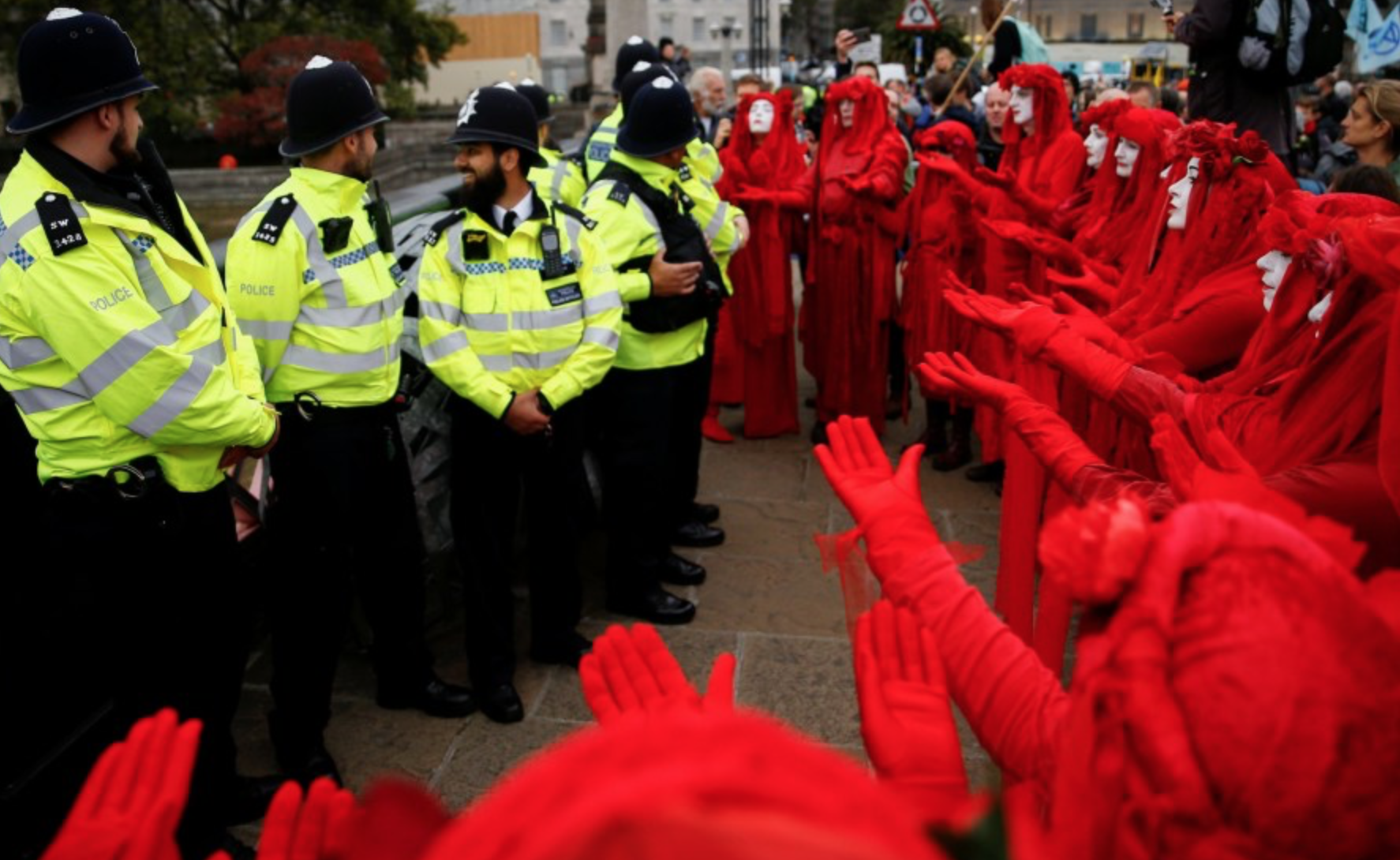Alternative Editorial: Back On The Streets
As we write, it’s the day before the launch of the Extinction Rebellion October Rising. Over the next few days tens of thousands of people will descend upon London from all over the UK to demand – without violence - that we pay attention to the environmental catastrophe we are in.
This comes a week after the international school strike, led by Greta Thunberg, in which 7.6 million people in 185 countries came out on the streets. But despite the largest ever environmental march in history, the UN’s response was poor.
While the school strikes last for a day, but repeat weekly on a smaller scale, the Rebellion beds itself into the streets of the capital for as long as it can. Causing a rising scale of disruption and with it, an escalating and deepening conversation in the media and wider society.
In the press briefing (see here, for a summary of the action so far), the organisers said:
To date, almost 10,000 people have confirmed that they will be coming to London to rebel, compared to 2,000 prior to April’s Rebellion. Amongst those confirming their participation, 5,000 have stated that they are willing to be arrested, 2,245 are willing to go to prison and 1,836 are prepared to go on hunger strike. Based on projections from April’s Rebellion, total numbers for this Rebellion could attract between 20,000 and 30,000 people.
As history has played it, again, MPs are unlikely to be sitting while XR begins to occupy Westminster: PM Johnson’s plan is to prorogue Parliament in preparation for a Queen’s speech. This could be good for liberating some headline space. On the other hand, when Parliament returns, Johnson will be intent on harnessing all our attention towards a narrow Brexit agenda. There could be serious clashes on the streets if the police are tasked with removing XR activists from the international gaze.
Over this time, A/UK has been contributing to XR in two distinct ways. Firstly, to help build the Future Democracy Hub (launched three weeks ago). Secondly, by taking part in a series of vision workshops – or Imaginarium - to identify what the future might look like if we began to take appropriate action. Our team (see below) were all described as ‘mainstreet’ actors, invited by XR co-creator Skeena Rathor. These are people who’ve been working for decades to change the current system, and are now happy to bring their experience to the XR frontline.
Over these gatherings, Skeena tasked us to talk about the present in a new way, helping to explain why we are in the mess we are in, the consequences and how it could be different. The work gave rise to a long-term narrative, which I share below. In it, we go deeper than describing guilty elites, and down to our historic ignorance of what makes life flourish. It’s not a detailed blueprint, but has the elements of an essential, transformative, shift.
Watch this space for how this story develops. Its aim is to help XR bring people together to face the huge task ahead.
NAVIGATING COLLAPSE THROUGH REGENERATION
Nature is cyclical, distributive and regenerative by design. It’s built on infinite systems of connection, linking each small part to the whole. But humanity has stepped outside this circularity, creating linear systems that are inherently divisive and degenerative by design. We are the only species to have created waste that cannot be recycled and climate change due to human interference in the carbon cycle.
However, we can start to step back inside the regenerative, cyclical systems of nature by emulating them. We start by reconnecting with each other, beginning in our communities where many of the solutions are already available.
Eliminating waste at all levels; collaborating on food and energy; implementing material systems that are not divisive and degenerative by default, but reconnecting, distributive and regenerative by design.
The more of our linear, disconnected systems that we seek to change along these principles, and the faster we are able to implement them, the safer our collective future will be.
But getting there is likely to include some level of collapse within our current civilisation.
We need to be informed about where we are vulnerable, prepare as best we can for a phase of transition, but also collectively envision a flourishing future we can work towards.
Where are we vulnerable?
Food and water security are where we are most vulnerable, due to our reliance on:
· fragile supply chains for imported food
· agricultural systems driven by economic rather than biological efficiency
· a disregard for basic issues such as water conservation planning within urban and rural areas.
Our centralised healthcare system is already vulnerable due to a lack of funding, globalized supply chains and reliance on a fossil fuel based pharmaceutical industry.
Our obsolete and linear economic system, driven by eternal growth from finite resources and measured by purely quantitative indicators such as GDP, is ultimately what has made us vulnerable in the first place.
Our sense of community is also vulnerable, due to our dependence on centralised systems and infrastructure, such as energy, food and water supplies and most importantly, media headlines. The disconnection from each other in the places we live has caused a deep loss of trust, making our streets feel threatening and our emotions easy to trigger by powerful outside forces.
Our whole culture is therefore vulnerable, as it is predicated on a world-view that is no longer tenable to maintain, driven by incentives that are incompatible with the health of natural systems.
We may also be reaching the zenith of an atomised, individualised, isolated sense of who and what we are in relation to each other, nature and the universe.
What could collapse mean?
Collapse will most likely be driven by food and water security issues, leading to migrations from equatorial regions, disruption to food supply chains and our diminishing dependence on rain-fed agriculture.
During collapse, major centralised systems - like healthcare - could be severely affected, as climate change triggers potential for disease alongside the compromised trade and production of vital medications.
Economic collapse and the potential end of the current banking system could be another consequence of climate change, impacting every aspect of our lives, causing mass societal breakdown as our globalised infrastructure fails.
Collapse could also bring an inevitable disruption to our sense of community, leaving many with limited access to the satisfaction of basic human needs. This will challenge us to move beyond a world built on competitive individualist values, to one that fosters a more universal sense of compassion, cooperation and collaboration.
These disruptions within our predominant culture will necessitate a systematic re-evaluation of what humanity actually needs, revealing the basic illusions upon which our prevailing world-view has been erected.
In collapse and transition, our sense of self will be challenged, forcing us through a deep inner journey, akin to the five stages of personal grief, but more universal in nature. Akin to a ‘planetary initiation’, this process can lead us beyond despair, into a greater sense of love, purpose, presence, motivation and active hope.
However, we don’t have to wait for collapse to begin that process. Many have been preparing for this time for decades and are busy building prototypes to help support the transformation needed.
What does a flourishing regenerative future look like?
A flourishing future will see us empowered as communities, with greater self-reliance over our food and water systems through more appropriate land use, integrating ‘re-wilding’ schemes with bio-diverse, regenerative agriculture, contributing to ecosystem restoration, localised economics, community solidarity and significant carbon sequestration.
This regenerative society will integrate more measures for ‘upstream’ preventative medicine, building immunity and resilience, alongside more biological approaches to health at all levels of living systems, from topsoil to rivers forests and oceans.
Our economics will see the emergence of localised and circular mechanisms, regenerating our self-reliance, recognising that economies can be built from ecologies, but ecologies cannot be built from economies.
This will also allow a more localised bioregional form of governance to emerge, giving communities control over their essential needs, regenerating community solidarity, resilience and self-reliance through genuinely participative democracy
This flourishing future will need the collective birthing of an ecological world-view, which celebrates diversity and complexity at all levels of society, while also being more comfortable with uncertainty.
A new sense of an ecological self can emerge through this process – empowered, expanded and engaged; connected, compassionate, collaborative and present. Consciousness will no longer seen as an emergent property of the brain, but recognised as fundamental at all levels of reality, validating our sense of interconnection and interdependence with all life.
This Copernican shift in our sense of self will inform the new systems we create, allowing a truly regenerative culture to emerge.
We can then move from a self-limiting and disempowered sense of separation, to an expanded sense of empowered interdependence. We can shift from a culture fixated on financial wealth, scarcity and competition - breeding depression, addiction, cancer and auto-immune diseases - to a culture that celebrates abundance, collaboration and connection, and fosters fulfilment, happiness and health.
Imaginarium: Clare Hedin, Cordula Reimann, Ed Gillespie, Danny Burns, Indra Adnan, Rabbi Jeffrey Newman, Julian Jones, Maia Eliot, Marc Lopatin, , Matthew McStravick, Paul Powlesland, Peter Head CBE, Rachel Bailey, Rory Spowers, Skeena Rathor.



